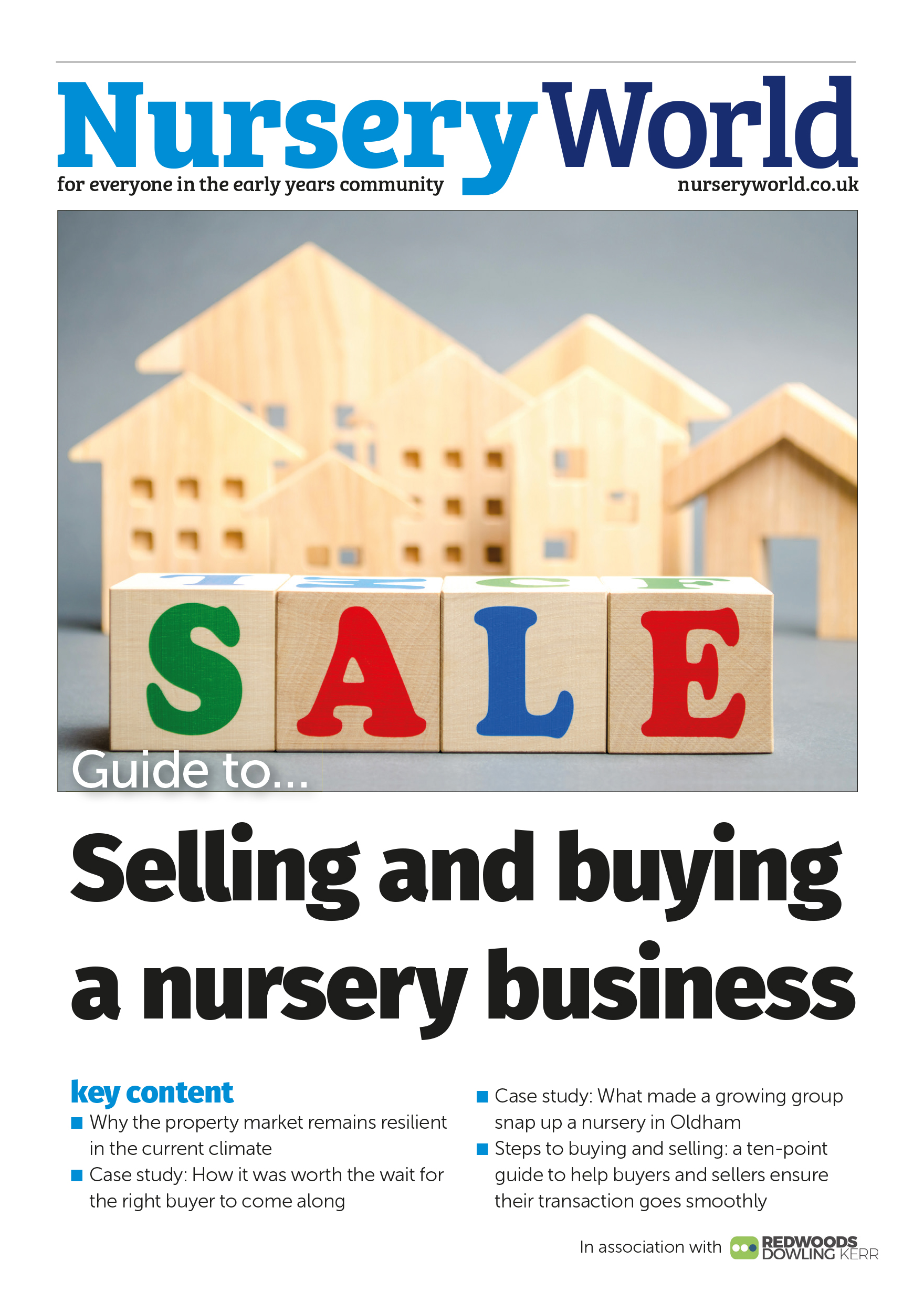

Key content
- Why the property market remains resilient in the current climate
- Case study: How it was worth the wait for the right buyer to come along
- Case study: What made a growing group snap up a nursery in Oldham
- Steps to buying and selling – a ten-point guide to help buyers and sellers ensure their transaction goes smoothly
State of the market
Covid-19 has left the economy reeling and hit the already under-funded early years sector with many nurseries left struggling to fill places but, perhaps surprisingly, it has not dented confidence among potential investors in the market.
With specialist nursery brokers Redwoods Dowling Kerr reporting enquiries rising by a staggering 142 per cent since lockdown it is currently very much a seller’s market. ‘New entrants and people who have registered with us say that this was always going to be their year to enter the sector, and Covid hasn’t changed that,’ says director of childcare and education, Jenna Caldwell.
‘People have seen how resilient the sector is and lending has remained in place so while the banks, and well-funded, cash-rich investors are supportive of the sector, people will continue to invest. It is still a highly desirable investment. Nurseries have remained open during the tough times and continued to generate income – obviously not as high as what it should have been – but the sector has shown resilience.’
While demand for nurseries remains strong, Ms Caldwell has seen a slight shift in those wishing to purchase. Large nursery groups are currently tending to concentrate on existing operations rather than acquire new settings, which is enabling smaller and more regional nursery operators to ‘snap up’ acquisitions.

Nurseries which have strong local reputations are attractive to groups who want to grow.
Personal choice
What buyers are looking for in a nursery is very personal. While some want a profitable and cash generative business, Robert Yates, head of sales at Redwoods, says others are looking to turn around closed or underperforming settings to gain ‘healthy adjusted profit levels’.
‘One thing becoming more of a necessity for future acquisitions will be outdoor space,’ says Ms Caldwell. ‘Those nurseries that have plenty of outdoor space have found the bubbles and social distancing easier than those that don’t. I can also see commuter areas being far more in demand, but central London may become quieter. Other than that, people want much the same as before. Buyers are looking for deals and are prepared to work to tight timescales to secure the right opportunities.
‘Fairly large registrations – those with a capacity of over 60 – are still predominantly of main interest to acquirers. We get an equal split of enquiries for leasehold as we do for freehold as long as the leasehold has a secure lease in place.’
She adds that it is imperative that owners understand what they have got to sell and whether leases are secure.

Exit plans
Currently there is not a rise in people wanting to exit the sector, but Ms Caldwell predicts it will happen. ‘I think they are currently trying to sort out the operations of their business – the staff who have been furloughed and the logistics of children returning and social distancing,’ she says.
‘For some, maybe those who were on the edge of considering exit, the pandemic will be the last straw along with those at retirement age, although some will want to get back to pre-Covid levels before exiting.’
Some owners are being cautious about putting their nursery on the market, but with buyers' enquiries ‘going through the roof’, now is a good time, advises Mr Yates. ‘I would encourage anyone considering their exit within the next two years to contact us to discuss if now is the right time for them to exit,’ he says. ‘It may not be the case for them, but it’s worth being one step ahead than one step behind. Even if now is not the right time, we can offer advice on what you can do to maximise your position.
Ms Caldwell agrees, ‘The childcare market, or any market regardless of sector, is always going to be strongest when the buyer market outweighs the supply and that is very much the case. We have reported massive rises in buyer enquiries.
‘If you are an owner thinking that you’ll leave it until next year, perhaps bear in mind there may be another 500 owners are thinking the same. You may find that actually coming to market now will put you in a better position because there may be a flurry of nurseries coming to market next year.’
For anyone considering putting their nursery on the market, Redwoods offers free consultations with no obligation to sell. ‘We will have an indepth discussion of the current market value, and if this doesn’t meet expectations we can provide information regarding how to reach desired goals,’ says Mr Yates. ‘We walk clients through how to prepare their business for sale and we can highlight their business’s unique selling points.’
CASE STUDIES
Completing a successful sale – how it’s done
Willowbrook Nursery in North Mymms, Hertfordshire
 ‘Selling my nursery was the most difficult decision I’ve made. It was 15 wonderful years, but my daughters are now grown up, and I turn 50 next year so it felt the right time,’ says Bambi Nicolas, whose nursery sale went through in July.
‘Selling my nursery was the most difficult decision I’ve made. It was 15 wonderful years, but my daughters are now grown up, and I turn 50 next year so it felt the right time,’ says Bambi Nicolas, whose nursery sale went through in July.
‘When Redwoods Dowling Kerr initially contacted me two years ago, I was actually quite offended at the thought of selling, but it got me thinking and later I was interested in receiving a valuation. I was surprised to be told how unique my nursery was. It’s a 40-place setting with more than eight acres of land where we run forest school sessions.
‘I decided to put the nursery on the market with RDK in November 2019 and was reassured that they would keep it confidential, which they did. I did feel I was being deceitful when I told staff that the valuer was from an insurance company, but I did not want staff and parents to be unnecessarily worried. We held viewings out of hours.
‘I thought the sale would be a slow process because of Brexit, but all the interest took me by surprise and made it feel very real. I think there was additional interest because there is lots of business potential. I’ve always only run the nursery during term time from 8.30am to 3pm, so there is scope for extra hours and it’s in an affluent area.
‘I found Redwoods very reassuring and helpful because of all their experience in the sector. The nursery was very much my baby and, rather than rush a sale, I wanted to be selective so that it went to the right person, not just for the right price. I liked that I never felt pushed by Redwoods and they gave me good feedback. The right buyer came along in December. She reminds me of a younger version of myself – a trained teacher, very caring and has ambitions for marketing the business.
‘Redwoods recommended a solicitor, which made the sale smooth because they were used to working together - it was just slightly delayed because of lockdown. Staff and parents were very shocked when they heard I was moving on, but I’ve not stepped away just yet. I’m now working alongside the new owner for a handover period, which is giving us all time to gradually adjust. I can see that I’m leaving the nursery in good hands.’
Smart Start Private Day Nursery in Oldham, Greater Manchester
' I am a trained teacher and started the nursery from scratch 20 years ago. At its peak it had 140 places with a waiting list,’ says former owner Cheryl Connell. ‘I sold it last year as a 68-place nursery with a before- and after-school club and minibus. We had gone from there just being one small nursery down the road to competition from around eight settings in a one-mile radius.
I am a trained teacher and started the nursery from scratch 20 years ago. At its peak it had 140 places with a waiting list,’ says former owner Cheryl Connell. ‘I sold it last year as a 68-place nursery with a before- and after-school club and minibus. We had gone from there just being one small nursery down the road to competition from around eight settings in a one-mile radius.
‘Running a nursery takes lots of energy and enthusiasm and I felt that I had reached my peak, so it was time to sell the business. I contacted Redwoods because I’d seen adverts in Nursery World and found them really knowledgeable. I had in mind a sum that I wanted for the business – three times our annual profits plus the value of the buildings – and the valuation was what I’d hoped for.
‘The nursery went on the market in March 2019, which was exciting, and the brochure looked great. I agreed a sale two months later after seven viewings and two offers. Unfortunately the actual sale was not easy and it was not completed until December. There were complications on my side because of the nursery being on a split site, and there were also delays with the buyer’s backers.
‘It was bought by a growing group which wanted to expand in the area and has a model of buying four nurseries in a ten-mile radius overseen by an area manager. My nursery’s reputation and close proximity to the other three settings influenced the sale, along with the potential for growth.
‘Selling the nursery was a rollercoaster ride which I could not have gone through without the skill of Redwoods, who communicated with the interested parties and solicitors, as well as being supportive of me. I was amazed at the amount of documentation I had to provide, from Ofsted registration certificates and finances to building planning permission.
The backers wanted an additional report from a structural engineer and conducted an Ofsted-style inspection to check the standard of care and education.
‘It was exhausting and made harder because I had to keep it secret from my staff so I did not jeopardise the sale. It was good that I had an honest and open relationship with the buyer and that I had a network of other owners in the sector who I could turn to along with my advisor at Redwoods.
‘Telling my staff when the sale was confirmed was hard, but they understood that it was time for me to move on. I don’t regret selling the business - I possibly should have done it sooner.’
Steps to buying and selling
- Find a confidential broker who has experience in the nursery sector. They will be able to oversee each aspect of the sale and give professional advice.
-
Choose a broker on their experience, references and whether you feel you can have a good working relationship with them. Clarify confidentiality arrangements and check what fees will be charged and when (these are likely to be linked to the value of your nursery).
-
It may be your pride and joy, but listen to the broker’s advice on a realistic selling price – or be prepared for a slow sale.
-
In order to gain the best price, ensure you keep your standards high even when you have decided to sell the business.
-
Seek out expert advice on tax issues to ensure you have everything in place to pay the correct amount of tax.
- Look critically at your nursery through the eyes of a buyer to decide what needs improving before you put it on the market.
- Ensure that your nursery is bright, smart and welcoming and that staff are friendly and children engaged.
- Many buyers will research other childcare businesses within a ten-mile radius, so know your competition. Compare your rates, services and occupancy and demonstrate to buyers that you are competitive.
- Critique your profit and loss account. Profitability is important to making a nursery attractive, but be careful not to skimp on expenditure to bump up profits.
-
Gather all the essential paperwork that buyers will want to see. This includes audited accounts for the past three years, projections for the current and following years, registration documents, Ofsted reports and property valuations. It is important to make sure that all these are up to date and filed in order, ready to be quickly produced when requested.
This 'Guide to...' has been produced by Nursery World in partnership with Redwoods Dowling Kerr
Redwoods Dowling Kerr offers bespoke services aimed at clients who are looking to expand and grow their nursery business, along with new entrants looking to enter the sector, and those looking to sell to realise maximum value for their investment.

Jenna Caldwell for buying advice on 01772 775763/
07525 592988 / jenna.caldwell@redwoodsdk.com
Robert Yates for sales advice on 01772 775759/ 07812 366958/ robert.yates@redwoodsdk.com
